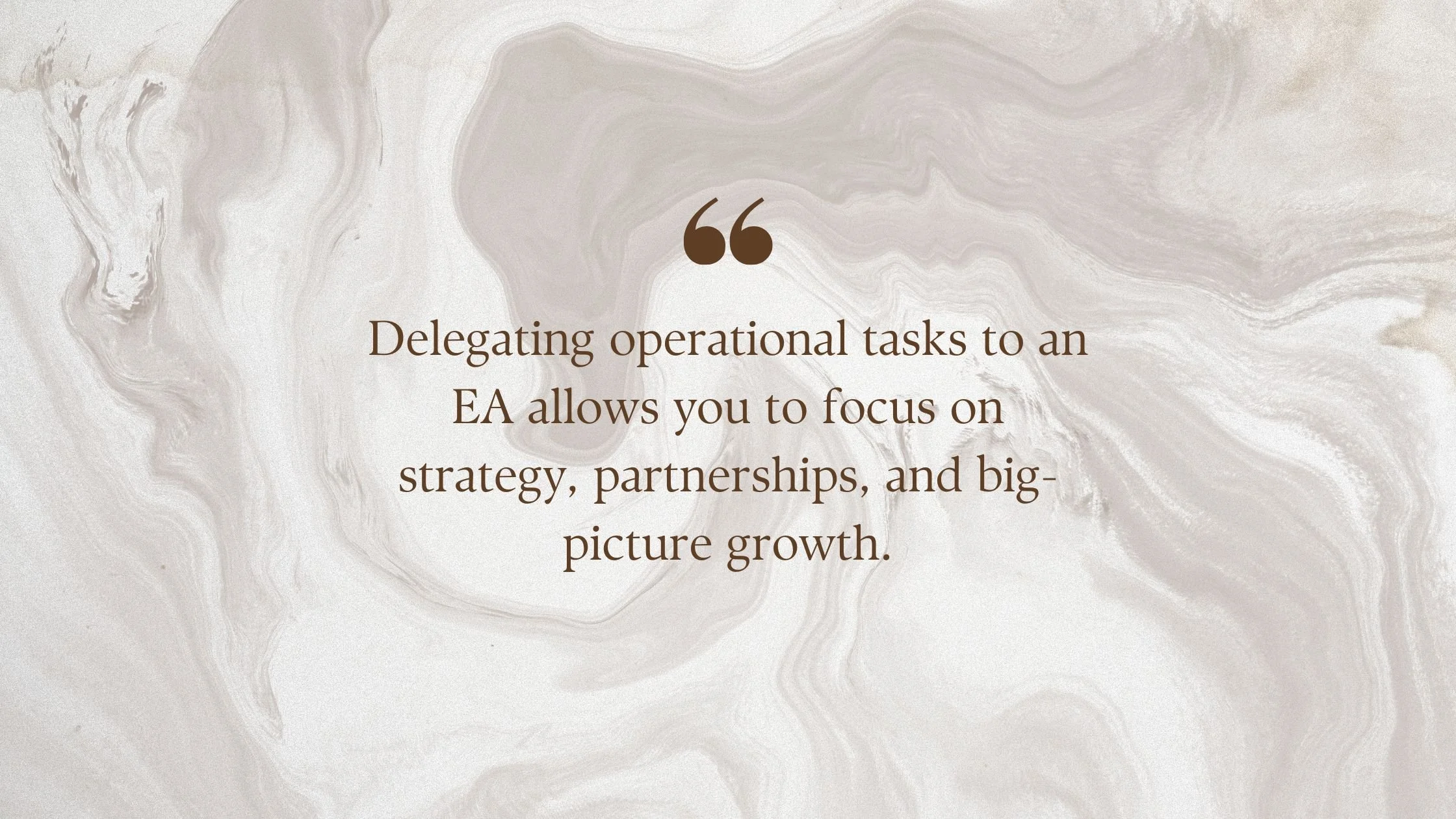The Power of a Well-Managed Calendar: How to Create Time for What Matters Most
Every "yes" you make on your calendar is a "yes" to a version of your life. The question is: Is it the life you want?
Let’s face it: for busy entrepreneurs and executives, the calendar is often more tyrant than tool. Meetings multiply, priorities clash, and suddenly, the day is gone—but your to-do list isn’t.
The truth? A well-managed calendar is more than a scheduling tool; it’s your secret weapon for success. When optimized, it doesn’t just help you do more—it helps you do what matters most. Here’s how to reclaim your time and transform your calendar into a precision instrument for growth and fulfillment.
Step 1: Start with the Big Rocks
The Problem: If you don’t plan your priorities, someone else will.
Stephen Covey’s metaphor of "big rocks" applies here. These are the non-negotiables—the strategic thinking, key relationships, or personal time that drive long-term success. If you let smaller tasks dominate, these priorities get pushed aside.
The Solution:
Block Your Big Rocks First: Reserve time on your calendar for high-value activities before anything else. This includes quarterly planning, brainstorming, or even your daughter’s soccer game.
Say “No” Strategically: Every “yes” to a meeting is a “no” to something else. Protect your big rocks fiercely.
Pro Tip: Schedule deep work in your peak productivity hours (usually morning for most) and save admin tasks for afternoons or lulls.
Step 2: Master the Art of Time Boxing
The Problem: Endless to-do lists feel productive, but they don’t help you finish.
Instead of listing tasks, assign each one a specific time slot in your calendar. This method, called time boxing, ensures that tasks get done without eating into your day.
The Solution:
Be Specific: “Write marketing plan” is vague. “Draft email sequence for X campaign, 9–10 AM Thursday” is actionable.
Leave Breathing Room: Pad your schedule with buffer time to handle overruns or unexpected issues.
Pro Tip: Automate recurring tasks—like weekly team check-ins—so they don’t take up mental space.
Step 3: Audit & Delegate Ruthlessly
The Problem: You’re doing too much. Period.
Entrepreneurs often wear too many hats, but time spent on $10 tasks is time stolen from $10,000 opportunities. Your calendar tells the truth: if it’s filled with busywork, it’s time for a change.
The Solution:
Audit Your Calendar: Look back at the past month. What could’ve been delegated, declined, or done faster?
Delegate Smartly: Tasks like inbox management, scheduling, or research don’t need you. They need someone capable (like an Executive Assistant).
Pro Tip: Outsourcing your calendar management to an expert can free hours every week. A skilled assistant doesn’t just schedule—they optimize.
Step 4: Protect Personal Recharge Time
The Problem: Your calendar is all business, no balance.
Burnout isn’t just bad for you—it’s bad for business. Your best ideas don’t come when you’re exhausted; they come when you’re recharged.
The Solution:
Schedule Downtime: Yes, literally. Block off evenings, weekends, or lunch breaks for yourself.
Plan Joy, Too: Add activities that energize you, whether it’s a workout, a coffee with friends, or reading time.
Pro Tip: Share your boundaries. When your team knows you’re unavailable at 6 PM, they’ll adapt—and respect you more for it.
Step 5: Review and Refine Weekly
The Problem: A static calendar is a stagnant one.
Life and business are dynamic, so your calendar should be, too. Taking time to review your week ensures you stay aligned with your priorities.
The Solution:
Weekly Planning Session: Spend 15 minutes every Sunday to review the week ahead. Adjust where needed.
Learn from Patterns: If certain meetings drag or tasks repeat, tweak how you approach them.
Pro Tip: Use tools like color coding or tags to visually prioritize at a glance.
Your Calendar Is Your Life
Every "yes" you make on your calendar is a "yes" to a version of your life. The question is: Is it the life you want?
When managed well, your calendar isn’t just a productivity tool—it’s a values statement. It reflects your focus on growth, family, and personal well-being. So, take control. Say no when you need to. And most importantly, create space for what matters most.
Your future self will thank you.
Ready to reclaim your time? Let’s talk about how strategic support can turn your calendar—and your life—around.
5 Signs You’re Ready to Hire an Executive Assistant
Burnout isn’t a badge of honor. If stepping away from your work feels impossible, that’s a flashing neon sign that you need support. CEOs who delegate effectively don’t just survive—they thrive.
Let’s face it—being a high-performing entrepreneur or CEO often feels like juggling flaming torches while balancing on a tightrope. You’ve built something great, but lately, the sheer volume of tasks is overshadowing your brilliance. Sound familiar? If you’re nodding (or frantically glancing at your never-ending to-do list), here are five unmistakable signs it’s time to bring in an executive assistant to reclaim your time and sanity.
1. Your Calendar Looks Like a Game of Tetris
If your daily schedule requires a PhD in puzzle-solving just to make sense of it, it’s time to delegate. Scheduling meetings, rescheduling meetings, and remembering why you scheduled those meetings—none of it should rest on yourshoulders.
🚀 Solution: An executive assistant can manage your calendar like a pro, freeing you to focus on high-impact decisions.
2. You’re Drowning in “Quick” Tasks
Email triage. Travel arrangements. Invoice follow-ups. These tasks promise to take “just a minute,” but collectively, they steal hours. That’s time you could spend driving growth or just breathing a little.
💡 Tip: Think of an EA agency as your secret weapon for turning a mountain of minutiae into smooth, invisible workflows.
3. You Can’t Remember the Last Time You Took a Day Off
Burnout isn’t a badge of honor. If stepping away from your work feels impossible, that’s a flashing neon sign that you need support. CEOs who delegate effectively don’t just survive—they thrive.
🏖 Win: A VA can keep the ship sailing so you can finally unplug without anxiety.
4. Your Team Looks to You for Everything
When the bottleneck is you, progress slows, and your team suffers. If you’re approving every purchase or chasing down project updates, it’s time to bring in a gatekeeper to handle the noise.
🔑 Pro Move: An EA acts as your trusted filter, keeping distractions away while ensuring critical decisions still cross your desk.
5. You’re Missing Opportunities to Scale
Click here to start the conversationere to start the conversation.Here’s the truth: You’re not just busy—you’re busy with the wrong stuff. If you’re stuck working in your business rather than on it, you’re leaving money and impact on the table.
🎯 Why It Matters: Delegating operational tasks to an EA allows you to focus on strategy, partnerships, and big-picture growth.
Bonus Sign: You just read this list and thought, That’s me.
You don’t need to do it all alone. Hiring an executive assistant agency is a power move, not a luxury. By offloading the tasks that keep you bogged down, you’ll rediscover the energy and focus that made you a leader in the first place.
Ready to take the leap? Let us match you with the right EA to transform your day-to-day and give you your time back.
Click here to start the conversation because your time isn’t just valuable—it’s priceless.
The Real Cost of "I'll Do It Myself"
You know that voice in your head? The one saying "Nobody can do this quite like me"? It's costing you more than you think. Leaders spend 41% of their time on tasks they could delegate. That's two full days of your week spent chasing invoices, wrestling with calendars, and drowning in admin.
Let me get real with you: Delegating is HARD. As someone who built a business helping others let go, I had to learn this lesson myself. That first time I handed over a inbox? My stomach was in knots. What if they missed something crucial? What if their way wasn't my way?
But here's the truth bomb: My way wasn't the only way. Sometimes, it wasn't even the best way.
Why We Resist You know that voice in your head? The one saying "Nobody can do this quite like me"? It's costing you more than you think. Leaders spend 41% of their time on tasks they could delegate. That's two full days of your week spent chasing invoices, wrestling with calendars, and drowning in admin.
The Trust Factor Here's what nobody tells you about delegation: It's not just about handing over tasks—it's about letting go of control. It's about trusting that you've hired the right person and understanding that different doesn't mean wrong. I learned this when my assistant reorganized my entire project management system. At first, I panicked. Then I realized: Her system was actually better than mine.
Your Delegation Starter Pack Start here. Hand off these tasks today:
Calendar management (because your time is worth more than playing email ping-pong)
Invoice chasing (goodbye, awkward follow-ups)
Inbox organization (focus on messages that matter)
Event planning (from concept to execution)
Admin work (those tasks that eat your day in 15-minute bites)
Master Delegation in 4 Steps
Start small (build trust with low-stakes tasks)
Be crystal clear (set expectations upfront)
Step back (resist the urge to micromanage)
Give feedback (help them help you better)
The Truth About Letting Go Delegation isn't admitting defeat—it's multiplying your impact. Every task you hand off is an investment in your most valuable asset: your time.
Think of it this way: Would you rather spend your energy chasing down payments, or charting your next big move?
Ready to reclaim your time? Let's talk about turning your "I'll do it myself" into "It's handled."
Bringing calm to Chaos
Practical tips and the value of outsourcing your email chaos to a pro.
Practical tips and the value of outsourcing your email chaos to a pro.
Ever calculated how much time you spend in your inbox? Studies show it's about 11 hours weekly—nearly a quarter of your workweek. Here's how to reclaim those hours.
Start Here: Quick Impact Steps
Schedule email time: Block 2-3 specific times daily for email. Outside those windows? Close that tab.
Create an action system: Use one simple tag labeled "ACTION" for emails needing your response. Color-code it if helpful.
Build a 5-folder system:
ACTION (needs your response)
WAITING (waiting on others)
REFERENCE (keep, but no action needed)
ARCHIVE (completed items)
DELEGATE (tasks for your team)
The 2-Minute Rule in Practice If it takes less than 2 minutes, do it now. Everything else gets sorted into your folder system or scheduled for later.
Making Inbox Zero Actually Work Inbox Zero isn't about emptiness—it's about intention. Each email should trigger one of four actions:
Delete/Archive
Delegate
Respond (if under 2 minutes)
Schedule time to handle it properly
Pro Tip: My Favorite Email Hack Create an "Action" tag for emails that must stay visible. Even if you can't process them immediately, they're instantly recognizable when you next check your inbox.
Advanced Moves
Use Unroll.me to mass unsubscribe from newsletters
Set up filters to automatically sort incoming mail
Schedule send times for non-urgent emails
Use templates for common responses
Need help implementing these systems or want someone to manage it all? Reach out today … be BOLD




